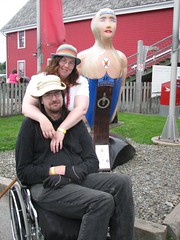Gentle reader, be cautioned: comments sections on mainstream media sites tend to not be safe and we here at FWD/Forward don’t necessarily endorse all the opinions in these pieces. Let’s jump right in, shall we?
From BBC’s Ouch, by Charlie Swinbourne, Deaf country life v deaf city life:
I’m soon to become a Dad for the second time, so we’ve started thinking about the long term, and where we want our children to grow up. With houses on the pricey side for anything bigger than a shed in our area of West London, we’re currently wondering whether we’d be better off bringing up a family outside the city. […] The capital is full of opportunities for deaf people, with weekly deaf pub meets, regular events, accessible cinema and theatre performances, and numerous deaf centres and sports clubs.
Badgermama presents Kids and wheelchair manners:
Please stop yelling at your kids just because they’re 20 feet away from a wheelchair! Nothing bad is going to happen. It really pisses me off when someone grabs their kid, yanks them “out of the way” and yells at them, just because I’m in the same grocery aisle or on the same sidewalk. Usually, the kids are nowhere near me. All these people are doing is teaching their children that people in wheelchairs are scary and weird.
Some good news from ysobel of i hear the voices when I’m dreaming in *sags in relief*:
So, there’s been this whole saga with trying to get a ramp to the front entrance of our church, made vastly overcomplicated by the fact that the church is a designated historical site blah blah blah. […] The church appealed to the city council, who had it on the agenda for tonight, after several postponements on their part.
Leah at Cromulent Words writes You Can’t See My Pain:
You don’t see me not talking about disability in class because I’m fraid of being silenced again. You see someone who doesn’t care about the assignment.
At random babble…, our own OYD writes Medical Autonomy Chronicles: The Virgin Pap Smear (do be warned, it’s graphic):
For all the talk of how having sex outside of marriage or whatever message had been pounded on me for however long, and how it would leave me hollow and leave me feeling worthless and damaged, and for all the ways I had been told that casual sex would leave me reeling and feeling depressed and with a hole of missing self-esteem, nothing I did in my consensual sex life has ever compared to the way that pelvic exam and pap smear felt to me, a fourteen year old girl. A person rising on the crest of womanhood, not yet there but ready to fly, and having had myself violated before I took my first steps.
Send your links to recreading[@]disabledfeminists[.]com. Let us know if/how you want to be credited.
